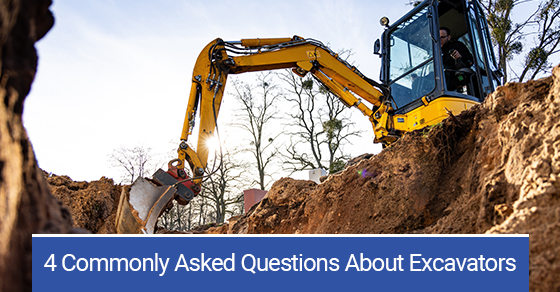
4 Commonly Asked Questions About Excavators

From construction sites to mining operations, there are many different applications for excavators. These versatile power horses can be used for everything from digging trenches, foundations, and holes to demolition, lifting heavy objects, and river dredging.
Excavators consist of a boom, stick (or dipper), bucket, and cab, which are mounted on a rotating platform known as the house. This house sits on top of an undercarriage that can be equipped with either tracks or wheels, depending on the type of excavator.
Excavators also use hydraulic cylinders, hydraulic fluid, and hydraulic motors, enabling them to move in powerful and precise ways. An excavator’s operator controls it from the cab, using a mixture of joysticks and pedals to manipulate the boom, stick, and bucket.
Most excavators can be used with several different attachments, including augers, breakers, grapples, hammers, and rakes, each of which enhances the functionality of this machine in various ways, tailoring its use to specific tasks.
Common Questions About Excavators
If you are not overly familiar with excavators and you are interested in adding one to your fleet, it is a good idea to learn more about this mighty machine before you go all in.
The following are some of the most common questions that people tend to ask about excavators, as well as the answers:
1. What are the different types of excavators and their uses?
There are several configurations and different sizes of excavators available. Each of these types is designed for specific purposes.
For instance, crawler excavators feature tracks that provide them with enhanced stability and maneuverability on uneven ground, soft ground, and other difficult surfaces. On the other hand, wheel excavators feature wheels instead of tracks, which gives them better mobility on hard surfaces like roads.
Mini excavators are more compact and lightweight, so they excel in tight spaces and are commonly used for utility work, residential projects, and landscaping. Long-reach excavators have extra long arms and booms, which make them perfect for jobs such as the demolition of high structures or dredging.
Finally, amphibious excavators are best for projects involving a lot of water, like river dredging, as they can be used both on land and in water.
2. What factors should be considered when choosing an excavator?
If you are thinking of purchasing an excavator for your fleet, there are some different factors to consider, such as the following:
- Size and capacity: You should buy an excavator of a size that aligns with the scope and scale of your specific projects. Think about factors like required lifting capacity, digging depth, and reach.
- Terrain and accessibility: Consider the kind of terrain that the excavator will mostly be used on, as well as the accessibility of the job sites. The softness or hardness of these surfaces may require one type over another.
- Fuel efficiency: It is always important to keep operational costs in mind, including fuel efficiency. If high fuel efficiency is a priority, keep an eye out for excavators with fuel-efficient engines or hybrid systems.
- Attachments: Different attachments are compatible with different types of excavators. Thus, consider the types of attachments that you will require for your projects and ensure you choose an excavator that can support them.
3. What safety precautions should be taken when operating an excavator?
As with all other heavy equipment, it is crucial to take safety seriously when operating or working around excavators. This means that all excavator operators should receive thorough training focused on safety protocols and best practices.
It is also critical to regularly inspect an excavator’s tracks or wheels, hydraulic systems, attachments, and other components to ensure everything is as it should be. Maintenance and repairs should be performed as needed, as broken-down parts can create safety hazards.
In addition, anyone using an excavator or working around one should use personal protective equipment, such as hard hats, safety glasses, steel-toed boots, and high-visibility vests.
Underground utilities should always be identified and marked before any excavation work begins. Also, precautions like grading techniques and support structures should be implemented when it is necessary to work on a slope.
4. Is it better to rent or buy an excavator?
Another major question is whether it is a better option to rent or to purchase an excavator. The reality is that both of these choices have their advantages, and which option is best depends on your particular needs.
When you rent an excavator, you only need to pay for it when needed. So, if you only require one on a short-term basis, this option makes more sense.
On the flip side, if you will regularly require an excavator for various ongoing projects, it might make more sense to purchase one.
Why Nors Equipment Is a Good Place to Acquire Your Next Excavator
Whether you are searching for an excavator to buy or are considering an excavator rental, Nors Equipment can help. We have a huge stock of excavators in our inventory that are made by some of the best manufacturers in the industry.
We are confident that we can find you an excavator that perfectly matches the demands of your construction projects and the budget you are working with. We carry excavators of many different types and sizes, as well as both new and used machines.
If you are uncertain about the kind of excavator that best matches your unique requirements, one of our heavy equipment experts would be happy to guide you in the right direction.
For more information about our excavator rental options or to learn more about the selection of excavators that we have available, call Nors Equipment at 1-833-730-0613 or contact us here.



